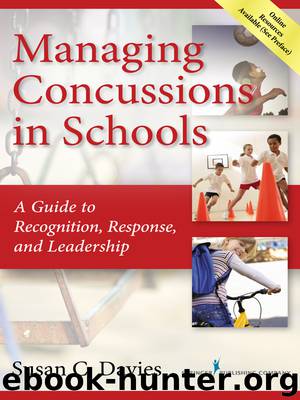Managing Concussions in Schools by Davies Susan Ed.D. NCSP;

Author:Davies, Susan, Ed.D., NCSP;
Language: eng
Format: epub
Publisher: Springer Publishing Company
Published: 2016-06-02T07:00:00+00:00
Figure 4.1. Acute Concussion Evaluation (ACE). Unlimited use granted for clinical and educational purposes. Centers for Disease Control and Prevention: Heads Up. Retrieved from www.cdc.gov/HEADSUP
NEUROCOGNITIVE COMPUTERIZED TESTING
Preseason baseline testing is used in many school districts with their student athlete population. The most widely used instrument is Immediate Post-Concussion Assessment and Cognitive Testing (ImPACT, 2013). This is a 20-minute computerized assessment of neurocognitive abilities. Student athletes take the assessment preseason to document a baseline score. This provides a reference point for how the student athlete’s brain functions when it is healthy.
Several additional computerized neurocognitive tests on the market include CogSport (also known as Axon), Concussion Vital Signs, King-Devick Test for Concussions, and ANAM4 (Automated Neuropsychological Assessment Metrics, Version 4). The neurocognitive test monitors are typically athletic trainers, school nurses, athletic directors, team physicians, or psychologists—all professionals who should be designated as members of the school-based concussion team. These tests are relatively inexpensive, unobtrusive, and easy to administer.
The computerized neurocognitive assessment typically measures player symptoms, verbal/visual memory, attention span (sustained and selective), working memory, processing speed, response variability, nonverbal problem solving, and reaction time. If a student sustains a concussion, he or she can take the test again to compare the data to baseline scores. This helps determine the extent of the injury and to what degree recovery of cognitive processes postconcussion has occurred. Without an established baseline, managing a concussion can be difficult and involves more subjective guesswork. For example, if a student who sustained a concussion only takes a neurocognitive test after the concussion, but there is no baseline—the student’s “average” score may be taken as an indicator that the concussion has resolved. However, an established baseline may yield scores that were well above average. Thus, for such a student, an average score is a precipitous drop and indicates that the injury is still affecting cognition.
Although neurocognitive tests can be valuable tools, there are a few drawbacks. First, neurocognitive assessment is not recommended during the acute states of recovery because the cognitive stress of taking the test can slow recovery. While the student is symptomatic, the actual process of taking the test can make symptoms worse. Another issue is that student athletes may know what this test is for and sometimes will “fake bad” during baseline so they are not sidelined during future games and practices due to a drop in scores. Next, the most common baseline test, ImPACT, does not test balance or vision, two brain functions that can be key indicators of concussion.
Neurocognitive assessments should only be one of multiple tools used in making return-to-play decisions. Other tools may include an evaluation about conditions that affect concussion recovery, past concussion history, a symptom checklist and/or rating scale, and a complete neuropsychological examination, which generally includes balance testing.
Download
This site does not store any files on its server. We only index and link to content provided by other sites. Please contact the content providers to delete copyright contents if any and email us, we'll remove relevant links or contents immediately.
The Art of Coaching Workbook by Elena Aguilar(50076)
Trainspotting by Irvine Welsh(20981)
Twilight of the Idols With the Antichrist and Ecce Homo by Friedrich Nietzsche(18285)
Fangirl by Rainbow Rowell(8774)
Periodization Training for Sports by Tudor Bompa(7900)
Change Your Questions, Change Your Life by Marilee Adams(7344)
This Is How You Lose Her by Junot Diaz(6415)
Asking the Right Questions: A Guide to Critical Thinking by M. Neil Browne & Stuart M. Keeley(5338)
Grit by Angela Duckworth(5278)
Red Sparrow by Jason Matthews(5180)
Paper Towns by Green John(4773)
Room 212 by Kate Stewart(4720)
Ken Follett - World without end by Ken Follett(4427)
The Sports Rules Book by Human Kinetics(4061)
Housekeeping by Marilynne Robinson(4042)
Double Down (Diary of a Wimpy Kid Book 11) by Jeff Kinney(3902)
Papillon (English) by Henri Charrière(3887)
Exercise Technique Manual for Resistance Training by National Strength & Conditioning Association(3771)
The Motorcycle Diaries by Ernesto Che Guevara(3766)
